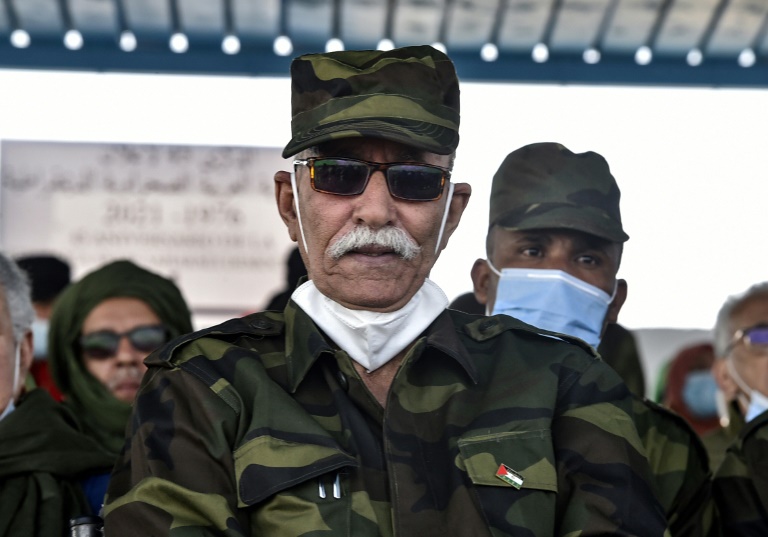The leader of Western Sahara’s independence movement, whose presence in Spain has angered Morocco, on Tuesday denied allegations of torture and genocide while being questioned by a Spanish judge.
Brahim Ghali, who heads the Algeria-backed Polisario Front, testified by video conference from a hospital in northern Spain where he is recovering from a severe case of Covid-19.
During the closed-door hearing at the National Court in Madrid, the judge turned down a request from the complainants for Ghali to be taken into custody or turn over his passport, arguing there was no flight risk.
Ghali, who is also the president of the Sahrawi Democratic Arab Republic, a self-declared state since 1976, was only asked to provide an address and a telephone number in Spain where he could be reached.
The Polisario leader is facing two investigations in Spain.
Ghali was severely ill when he arrived at a hospital in the northern Spanish town of Logrono in mid-April, with his presence in Spain triggering a major diplomatic spat between Rabat and Madrid.
Last month, Spain was caught off guard when as many as 10,000 people surged into its tiny North African enclave of Ceuta as Moroccan border guards looked the other way, in what was widely seen as a punitive political gesture.
The Algeria-backed Polisario Front has long fought for the independence of Western Sahara, a desert region bigger than Britain which was a Spanish colony until 1975.
Morocco controls 80 percent of the territory, while the rest — an area bordering Mauritania that is almost totally landlocked — is run by the Polisario Front.
– ‘War criminal’ –
Spanish online newspaper El Confidencial reported that an Algerian government plane had departed on Tuesday morning for Logrono to pick up Ghali but then turned backed.
Asked about the report, Spanish government spokeswoman Maria Jesus Montero said she had “no knowledge of any flight which was sent back or stopped.”
Citing diplomatic sources, Spain’s El Pais newspaper said Ghali was “critically ill” when he arrived on a medicalised Algerian government plane on April 18, bearing a diplomatic passport.
It said he was admitted to the hospital under a false name for “security reasons”.
Rabat, which considers Ghali to be a “war criminal”, has demanded a “transparent investigation” into Ghali’s arrival in Spain with what it said was a forged passport.
In response, Spain’s Prime Minister Pedro Sanchez said Monday it was “unacceptable” for Morocco to “attack Spain’s borders” by letting migrants into Ceuta due to “differences in foreign policy”.
Ghali’s lawyer, Manuel Olle, said his client “did not come in secret, he entered with his passport, close to death.”
The accusations against Ghali “are totally false” and are “politically motivated to target the credibility of the Sahrawi people,” he told journalists.
Olle also suggested that Rabat was behind the lawsuits against Ghali in Spain.
– ‘These tortures are confirmed’ –
One of the lawsuits relates to allegations of torture at Sahrawi refugee camps in Tindouf, a town in western Algeria.
The accusations were made in 2020 by Sahrawi activist Fadel Breika, who also holds Spanish nationality.
While a Spanish court initially rejected the complaint, it agreed to reopen the case earlier this year.
“The tortures are confirmed by thousands of witnesses,” said Breika’s lawyer, Maria Jose Malagon Ruiz del Valle.
The second investigation relates to allegations of genocide, murder, terrorism, torture and disappearances made in 2007 by the Sahrawi Association for the Defence of Human Rights (ASADEDH), which is based in Spain.
The UN refers to Western Sahara as a “non-self-governing territory”.
After 16 years of war, Rabat and the Polisario signed a ceasefire in 1991, but a UN-backed referendum on self-determination has been repeatedly postponed.
Morocco is willing to offer it within Morocco but not independence.











